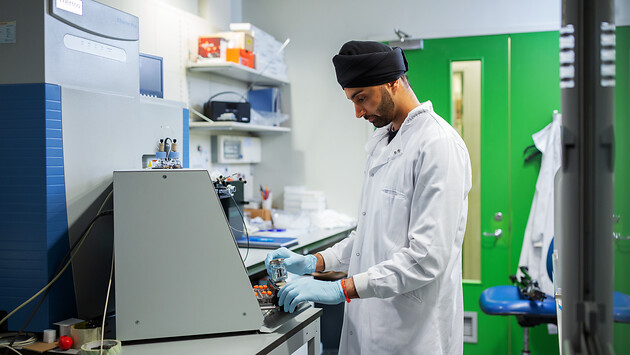Making laboratories greener with LEAF

Scientific breakthroughs often make positive headlines, but the materials and energy needed to deliver excellence take their toll both financially and environmentally.
A typical lab will consume three to ten times more energy per m2 than standard office spaces. Combine this with the lab waste from consumables, which commonly end up in landfill or are incinerated, and it’s clear to see that something needs to change within the sector.
Back in 2018, University College London set out to revolutionise best environmental practice for university laboratories across the country. The Laboratory Efficiency Assessment Framework (LEAF) has been in operation ever since, with 19 universities and four research institutions having piloted LEAF between 2018 and 2020.
Historically, there’s been a lack of standardised guidance on how to make labs more environmentally sustainable. But as we’re seeing more and more damage done by climate change, many are now looking for a viable way to build this awareness into day-to-day lab usage. LEAF is designed to do just that.
With the UK hosting COP26 this year, the role of the framework has grown as universities are focussing more on their own environmental impact. There have been inspiring stories and encouraging figures coming from those involved with the framework, with overall results showing that 648 tCO2e was avoided over two years – that’s the equivalent of 140 passenger vehicles taken off the road in a year.
Here are some highlights of how five of our SES partner universities have been getting on with LEAF.
Geography at King’s gets gold
Despite challenges posed by the COVID-19 pandemic, King’s College London’s John B Thornes Lab received a gold LEAF accreditation in 2020 in recognition of its commitment to sustainable waste and recycling, equipment management, procurement and more.
This sits alongside the department’s gold status awarded by the National Union of Students (NUS) Green Impact scheme for its ongoing commitment to sustainability.

Supporting labs on sustainability
Imperial College London aims to be a net-zero carbon institution by 2040. As part of this, the university is taking steps to improve the environmental output of its laboratories.
Imperial has accelerated the success of LEAF by incorporating it within the Estate Operations team, meaning labs across the university have centralised support to achieve the framework.
Last year, 21 out of the 50 labs who registered interest completed the framework, with six silver and 15 bronze LEAF certifications awarded. Imperial is encouraging those labs who didn’t manage to take part to get involved this year to further the impact of the programme.
Launching LEAF across different labs
Queen Mary University of London has launched a dedicated sustainability committee, and has added LEAF within their laboratory review. To facilitate this across the university, Kate Thornton, technical resource manager for the Faculty of Science and Engineering, is co-ordinating the launch of the framework.
Kate is an Associate Member of the Institute of Environmental Management & Assessment and will be working closely with technical and research staff to make a direct impact on sustainability in all laboratory areas.
Oxford surges in the LEAF medal table
With 23 LEAF awards given out this year alone, including four gold and 11 silver, the University of Oxford is excelling in its LEAF accreditations.
Sitting within Oxford’s bigger Green Impact programme means that LEAF is tightly incorporated within the university’s sustainability priorities. Labs are encouraged to use LEAF to score points towards their overall Green Impact award – with achievements recognised by the Vice-Chancellor’s Awards for Sustainability.
One lab owner said: “Working towards LEAF accreditation empowered me to raise and address sustainability issues in our lab. It was really helpful having the criteria as guidance.”
Making UCL sustainable
As the creator of LEAF, UCL has set an example to others by making LEAF integral to its Sustainable UCL programme.
From the London Centre for Nanotechnology to the Division of Medicine to the Institute of Archaeology, 72 UCL labs received a LEAF award for the 2019/2020 academic year – with the 2020/2021 figures soon to be announced. To further spread its influence, the LEAF Twitter account has been promoting the good news stories coming from other institutions using the tool, and recently celebrated the 50th sign-up to the framework.
Project details
Developed by Sustainable UCL, the non-profit and user-driven framework is unique as it combines both research quality and sustainability good practice.
Each lab user has a set of clear tasks, which require low administration, helping to save plastics, water, energy and other resources. Users can estimate their impact immediately using LEAF’s calculators and supporting technical resources. Laboratories are then awarded a Bronze, Silver or Gold accreditation depending on how many sustainability actions they take.

Martin Farley
LEAF manager


